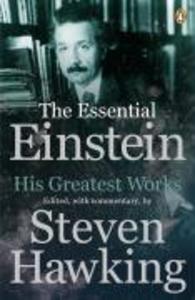
Zustellung: Fr, 20.12. - Sa, 28.12.
Versand in 3-4 Wochen
VersandkostenfreiBestellen & in Filiale abholen:
Albert Einstein changed the way physicists view the universe - and transformed the way we all see the world. His Theory of Relativity stunned scientists, but it is integral to modern thought as the important scientific discovery of the twentieth century. This volume collects Einstein's own writings on the Theory of Relativity.
In this unique single volume, Stephen Hawking has assembled the highlights of Einstein's groundbreaking scientific work. Collected here are Einstein's own illuminating writings on the Theory of Relativity, which present a world of paradoxes in which space is bent and time is curved. Yet Einstein was known not only for his landmark ideas in physics. Here too are his reflections on politics and religion, and his musings on the ultimate significance of his scientific findings.
Produktdetails
Erscheinungsdatum
25. August 2008
Sprache
englisch
Seitenanzahl
480
Autor/Autorin
Albert Einstein
Herausgegeben von
Stephen Hawking
Verlag/Hersteller
Produktart
kartoniert
Gewicht
346 g
Größe (L/B/H)
197/128/25 mm
Sonstiges
B-format paperback
ISBN
9780141034621
Entdecken Sie mehr
Bewertungen
0 Bewertungen
Es wurden noch keine Bewertungen abgegeben. Schreiben Sie die erste Bewertung zu "The Essential Einstein" und helfen Sie damit anderen bei der Kaufentscheidung.










